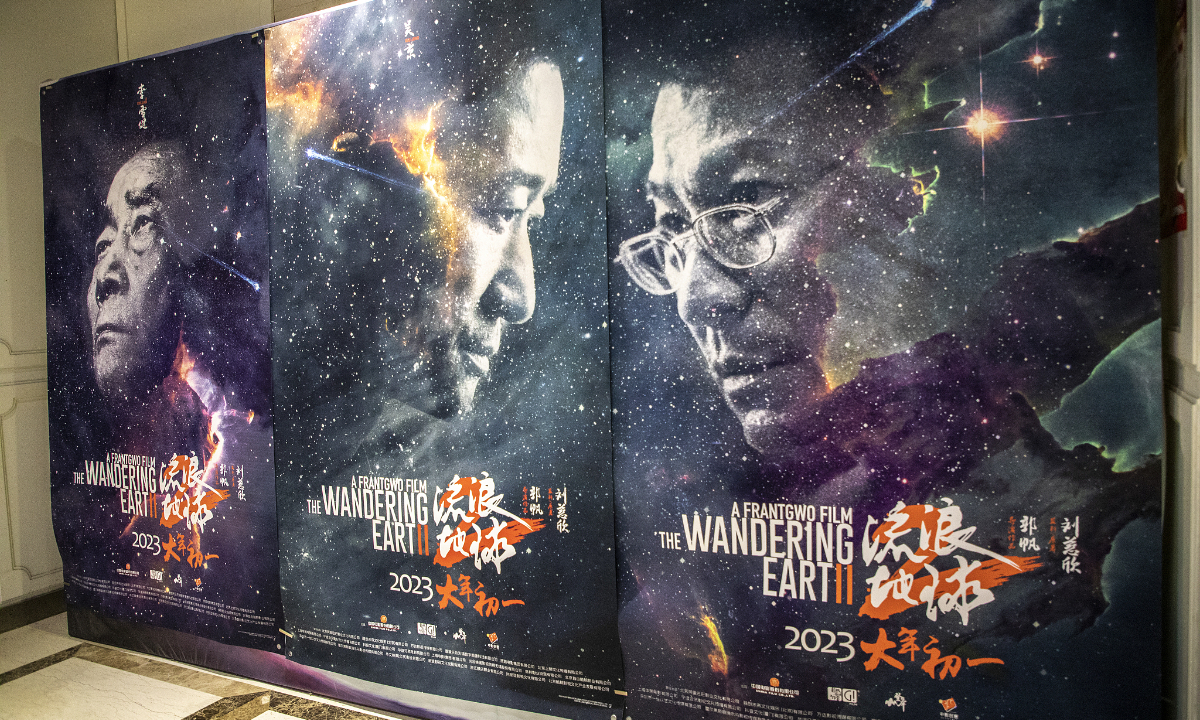
Posters of the Chinese science fiction film The Wandering Earth 2. Photo: VCG
A crisis is in the air: The sun has become unstable and within 100 years, it will expand to consume the Earth. Within 300 years, the entire solar system will be gone. People are hesitating between the Moving Mountain Project, an alternative aimed at moving Earth away from the solar system and preserving human consciousness on computers through the Digital Life Project.
Being told that 90 percent of the American people support Digital Life Project, Chinese diplomat Zhou Zhezhi showed a photo to American diplomat, Mike, a photo of Earth taken in 1990 by NASA's Voyager-1 at a distance of 6 billion kilometers from the Sun.
"It is our home, our planet," said Zhou, reminding me who sat at a downtown cinema in Beijing for
The Wandering Earth II inspired by Chinese writer Liu Cixin's novel on the very first day of the Chinese New Year of the scientist Carl Sagan's book
Pale Blue Dot: A Vision of the Human Future in Space, in which he wrote: "Look again at that dot. That's here. That's home. That's us."
From
The Wandering Earth four years ago to this year's prequel, director Guo Fan always hopes his audience remember that because of nostalgia for the homeland and hometown, we don't escape from Earth in a spaceship when facing such a crisis, but choose to wander with the planet.
It is even more important to boost the story narrative by digging out the inner world of the characters, expressing their importance to family and longing for their loved ones, which is deeply rooted in Chinese culture.
In the movie, Chinese astronaut Liu Peiqiang (Wu Jing) remembers his wife and son as scientist Tu Hengyu (Andy Lau) shares his love for the dead daughter by uploading her personality into an experimental AI. Their stories always prove Zhou's word: "In times of crisis, unity above all. Remember the day that people's courage transcends the history."
It is even truer today after humanities' three-year war against the COVID-19 pandemic as only courage and unity can win over crisis, in science fiction or in reality.
Ever since the outbreak of pandemic in early 2020, thousands of medical workers were deployed to combat the deadly virus without even sufficient personal protection equipment, as were volunteers and community workers. Their collective efforts are remembered in the movie as thousands of volunteers just like them scramble to the frontline to maintain the order and rescue the people when the lunar crisis approaches. All are wearing red vests with the eye-catching "CCP" written on the back.
Unity is the spirit that flows through the blood of Chinese people, something that can be shared with the rest of the world and inspire more for the humanity's resilience.
In the movie, Zhou also delivers a powerful speech on unity. He pointed to a photo of a human femur from more than 10,000 years ago and said that it was a femur that healed after being broken. He was rescued...he was healed, he was fed, and, he survived, which is what civilization really means -- mutual help. Collectivism is the foundation of the human civilization.
People are being moved to tears, myself included, at the scene when the astronauts from China, Russia, France, Singapore and Japan voluntarily detonate nuclear bombs by hand, to explode the moon in the hope of saving Earth.
For the entertaining elements,
The Wandering Earth II contains all big scenes like the drone swarm battles, space elevators, and nuclear explosions necessary to satisfy the cravings of action-hungry audiences.
China's fast development and progress in space technology has provided fertile soil for the creation of science fiction films.
We have witnessed so many important moments like the Chang'e lunar mission and Tiangong Space Station in the past years and are expecting more scenes and even greater achievements featured in Chinese sci-fi movies, which allows sci-fi film creators to produce richer and more diverse works.
It was nearly 11 pm when I walked out the cinema while many were still waiting outside for mid-night screenings. I inhaled the freezing but fresh Beijing air. The Earth is so beautiful and alive.




